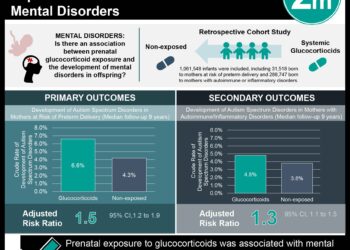Nausea and vomiting inversely associated with pregnancy loss
1. In a cohort of women with prior history of pregnancy loss, nausea and vomiting were associated with reduced risk of pregnancy loss.
2. There was also a trend towards decreased pre-implantation loss in this population as well.
Evidence Rating Level: 2 (Good)
Study Rundown: Nausea and vomiting are common symptoms of clinical pregnancy and affect the majority of women. Prior study has suggested that these symptoms may be signs of viable pregnancy, and their absence a possible marker of pregnancy loss. Prior studies examining this have relied on recollection of symptoms after diagnosis of clinical pregnancy. This study was a secondary ad hoc analysis of a randomized control trial that examined effect of low-dose aspirin on preventing pregnancy loss. The study consisted of a cohort of women with a history of 1 or 2 prior pregnancy losses who were trying to conceive.
The results showed that symptoms of nausea with vomiting were associated with reduced risk of pregnancy loss. There was also a trend towards lower risk of pre-implantation loss but this was not statistically significant. The described study had a number of strengths including the prospective nature, and high rate of follow up and questionnaire completion. The main limitations of the study included a narrow demographic (96% Caucasian), limited focus on first trimester data, and low numbers of those with hyperemesis syndromes. Additionally, any mechanistic relationship between nausea/vomiting and pregnancy loss remains unclear.
Click to read the study, published today in JAMA Internal Medicine
Relevant Reading: The protective effects of nausea and vomiting of pregnancy against adverse fetal outcome—A systematic review
In-Depth [prospective cohort]: This study was an ad hoc secondary analysis of a cohort originally recruited as part of the Effects of Aspirin in Gestation and Reproduction (EAGeR) study – a multi-center block randomized placebo-controlled trial of aspirin use to prevent pregnancy loss. Data were collected from June 2007 to July 2011. Women were included if they were 18 to 40 years-old, trying to conceive, and had a history of 1-2 pregnancy losses and followed through 6 menstrual cycles and then through pregnancy if conception occurred. The current study was limited to those who conceived during the study period. Pregnancy was defined as positive hCG testing. Gestational age was confirmed by week 6/7 ultrasonography or last menstrual period for those with pregnancy loss prior to ultrasound. Participants maintained daily diaries of symptoms including nausea, and vomiting during the preconception period until week 12, after which symptoms were assessed monthly. Diary data was summarized into week-level variables.
Of the 797 women included in the study, 188 of pregnancies ended in loss (23.6%) – 55 occured during the peri-implantation phase and 133 were clinically recognized losses. At gestational week two, 17.8% of women had nausea, while 2.7% reported vomiting. By week 8, 57.3% reported nausea and 26.6% reported vomiting. Women with nausea had a hazard ratio of 0.50 (95%CI 0.32-0.82) for pregnancy loss, while those with vomiting had a HR of 0.25 (95%CI 0.12-0.51). Among those with clinical pregnancy, nausea had a HR of 0.44 (95%CI 0.26-0.74) and vomiting had a HR of 0.20 (95%CI 0.09-0.44) for pregnancy loss. Both of these scenarios showed an inverse relationship between symptoms of nausea and vomiting with pregnancy loss.
Image: CC/Wiki
©2016 2 Minute Medicine, Inc. All rights reserved. No works may be reproduced without expressed written consent from 2 Minute Medicine, Inc. Inquire about licensing here. No article should be construed as medical advice and is not intended as such by the authors or by 2 Minute Medicine, Inc.







